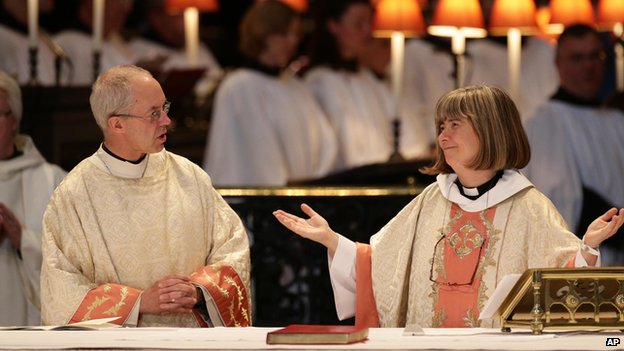The Church of England’s ruling General Synod is preparing for a vote on whether to introduce women bishops.
Members of the Synod will decide on Monday if the Church is to open its top jobs to both sexes 20 years after women were first ordained as priests.
Supporters of the move have expressed cautious optimism it will succeed.
A previous attempt to make the change failed by just six votes in November 2012. Two years on, the composition of the Synod is unchanged.
Rowan Williams, the Archbishop of Canterbury at the time, said the Church “lost a measure of credibility” after the result.
The proposal was passed in the Houses of Bishops and Clergy, but failed to gain the required two-thirds majority in the House of Laity, consisting of elected lay members.
However, four of those who voted against it then have since said they will back the latest plans – potentially enough to swing the result.
‘Incomprehensible’
The legislation – to be voted on at York University – would allow traditionalist parishes unwilling to serve under a woman bishop to request a male alternative.
An ombudsman would arbitrate in the case of disputes.
If it is approved, observers believe the new legislation could see the first women bishops appointed as early as this year.
One of the General Synod’s lay members Margaret Condick said the 2012 defeat had brought the body into disrepute.
“People say ‘why have you taken so long, what is the problem?'” she told the Synod.
“It is incomprehensible to most people.”
Outside of the Church of England, there are more than 20 Anglican women bishops in active ministry.
Another member of the General Synod Christina Rees told the BBC the failure to introduce full equality meant there was “still a question mark over the validity of women” in the Church.
But Margaret Brown – who is campaigning for less liberal members of the Church to have their own division, or province – said: “We would not have women bishops. We would not have women priests.
“We would not go down the line of homosexual practice and divorce and remarriage. We want the gospel, the supremacy of the scriptures, to come and be taught to everybody.”
According to the Guardian, if the legislation is rejected again, Archbishop of Canterbury Justin Welby is planning to drive it through regardless.
Among the options the newspaper said the archbishop was considering were “immediate dissolution” of the Synod to allow fresh elections or bypassing the body by introducing the legislation in Parliament via bishops in the House of Lords.
A spokesman for Lambeth Palace said: “We are concentrating on getting the vote through. It would not be helpful to speculate further.”
The simplified, latest version of the proposal was introduced to the General Synod last year.
Divisions
A “yes” vote would be likely to deepen divisions in the Church over the issue as some of its members already dispute the authority of women priests.
Under the plans, a woman bishop would be able to ordain priests which some opponents say is not only unacceptable but theologically impossible.
Church leaders, including the archbishop, have spoken of the potential disaster to its reputation if the legislation fails again.
The BBC’s religious affairs correspondent Robert Pigott said proponents of the change claim the Church of England’s status as the established or state Church might be put at risk.
If the plan is approved, it would then go to the ecclesiastical committee of Parliament and the House of Commons and House of Lords.
The General Synod would then meet on 17 November to announce formally that women can be bishops.
The vote comes as moves to legalise assisted suicide caused further division in the Church.
Former Archbishop of Canterbury Lord Carey – previously a vocal opponent of amending the law – said on Saturday he had changed his mind having witnessed the suffering of terminally-ill patients.
But Archbishop Welby warned against allowing a “sword of Damocles” to hang over vulnerable and dying patients. The Church has called for a Royal Commission to examine the issue.
Peers are due to debate the Assisted Dying Bill at second reading in the Lords on Friday.
Source: BBC


